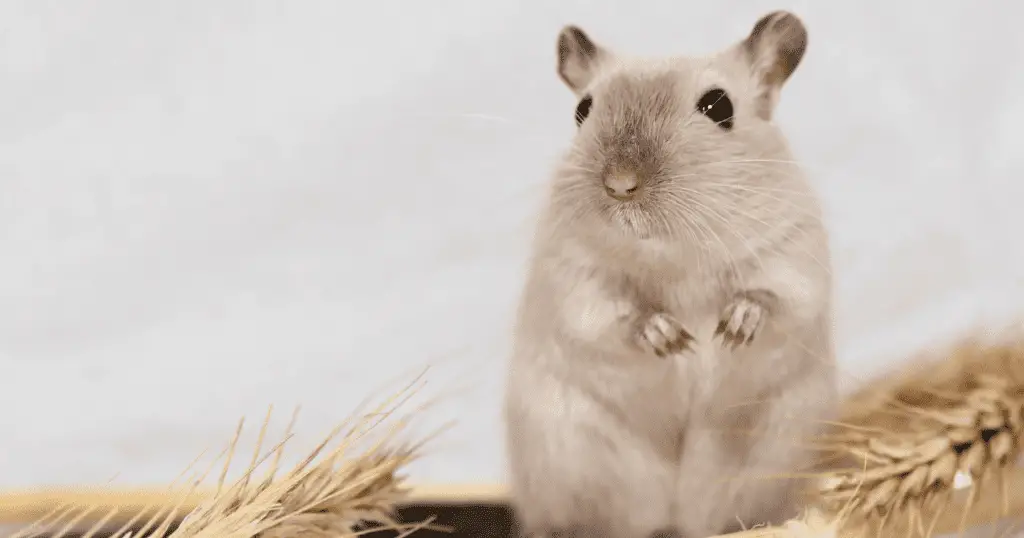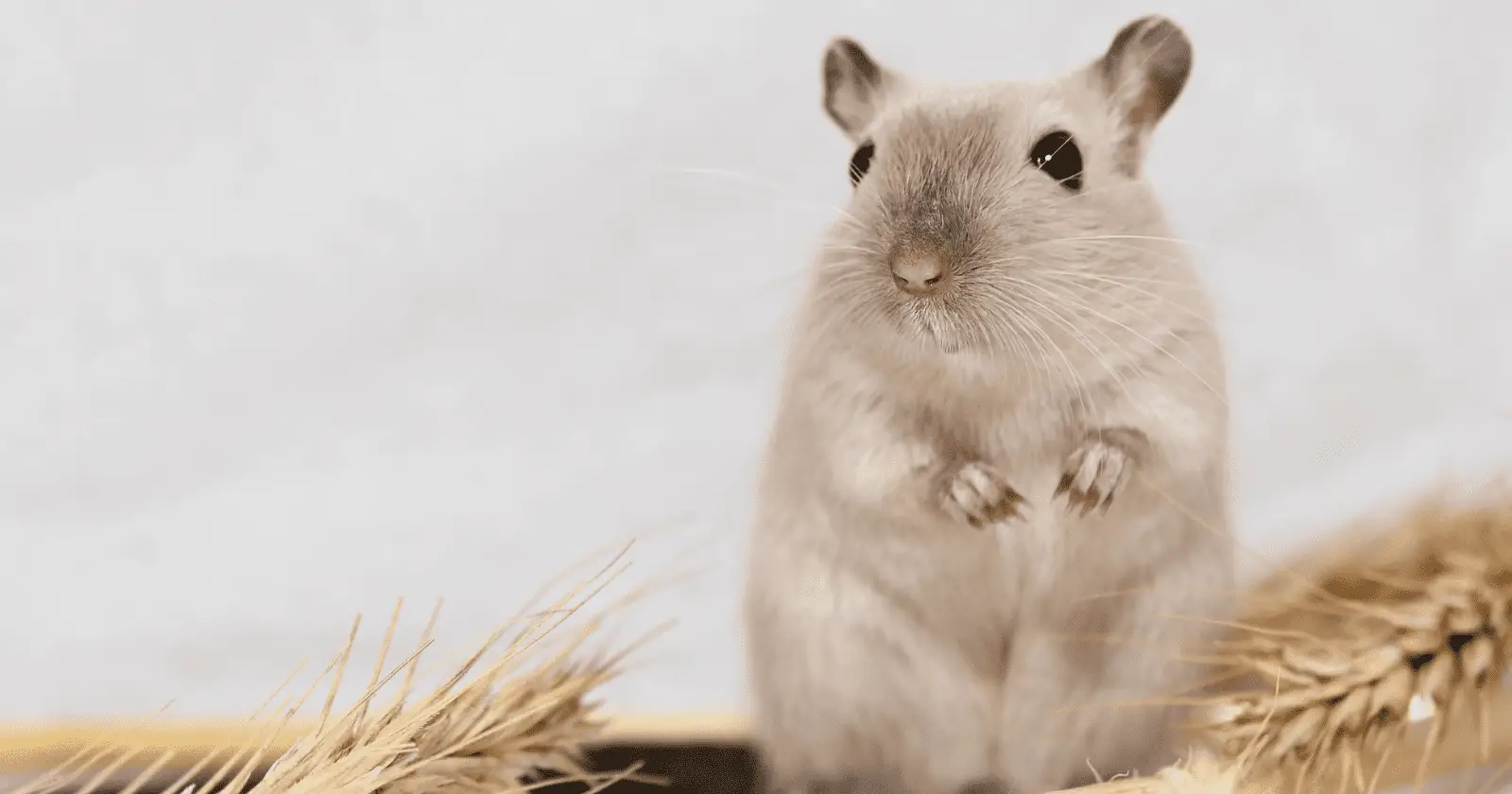Gerbils are small and cute members of the rodent family, with over 80 different breeds found in the wild. The most popular domestic breed is the Mongolian gerbil. Their wild relatives are found in the desert areas of Central Asia, India, Africa, and the Middle East, they are also called Desert Rats.

They are docile and calm pets, and with hand training, they can be quite friendly. They are not cuddly pets. However, children should be supervised when handling them, as they are small and squirmy and can be accidentally injured by small hands.
Gerbils are intelligent and love to play. They are also very social and live in colonies, they can become lethargic if kept alone.
How big do Gerbils grow?
Gerbils grow to about 4 -8 inches long, with their tails being as long as their bodies. Their tales are very sensitive and should never be pulled or grabbed to stop them from running around or picking them up.
Domestic Habitat
What do they need to be kept in?
Gerbils are desert burrowing animals. They dig shallow tunnels, so their habitat needs to take this into account, with enough loose bedding that they can burrow and hide. They should have at least 4-6 inches of bedding to be able to burrow into.
Ideally, a glass aquarium (at least a 30-Gal size for 2 gerbils) with a secure fitting mesh lid (they can also jump) works best. Buy the biggest enclosure you can afford.
Gerbils have powerful back legs and burrow with their front legs while kicking the debris out behind them, their bedding cannot be fibrous or stringy as this can get caught around their limbs.
Metal cages will not contain all the kicked-out bedding, so if you use one of these, be prepared to clean up debris from their cage often.
Read my article: The 5 Best Pet Insurance Affiliate Programs
Do they need accessories in their cage?
Gerbils are very active and need a variety of objects to play, hide, and climb on. Unprinted cardboard works well. It will have to be replaced often, and an igloo to play on and in and an exercise wheel with a solid base are vital to providing.
Pieces of PVC pipe can also be used, the minimum diameter should be at least 5 inches. Exercise balls are not recommended for gerbils.
Can they be kept in a bedroom?
Gerbils are generally most active during the day, but they can also be active at various times during the night. As they often sleep and wake multiple times within a 24-hr period, it is like them having several days to one.
Although they are cleaner in their habitat than most small rodents and therefore not as smelly, it is not recommended that a gerbil is kept in a bedroom. They are also very sensitive to high-frequency areas as well, so in a high traffic area close to TVs and stereo systems is not recommended.
A quiet area, away from electronics and the hustle and bustle of the house and other pets, works perfectly.
Can I have just one?
Gerbils are not solo animals and do not do well as the singular inhabitant of a home. They can breed at a young age, so same-sex littermates, either a pair or group, would be the best option for a harmonious environment.
If you need to introduce adult gerbils, be prepared for a lengthy introduction period – where you would separate them in the same enclosure for a period before letting them cohabitate in the same area. They are fiercely territorial and, if introduced too quickly, will fight, severely injuring or even killing each other.
Where do they sleep?
Gerbils require somewhere safe and dark to sleep. Again, an earthenware, pottery, or metal container works best. A terracotta flowerpot half buried in the corner is ideal.
If you choose a sleeping container that they can chew on, such as plastic or wood, be prepared to replace it often.
How often do I have to clean their enclosure?
As they are desert animals, they do not urinate very much, and their excrement is hard small pellets, it is recommended to tidy up their enclosure every few days, their food dish should be cleaned every day, and their water kept fresh and clean too.
Removing hoarded food and pellets daily is a good habit to follow. Gerbils are very low maintenance and can be easily kept with about 15 minutes of daily care.
It is unnecessary to completely strip and scrub down their enclosure weekly; if you stay on top of removing debris and their pellets every day, their bedding can be replaced little by little, thus constantly turning over the material.
A full clean of their enclosure with mild soap and water can be done about every 2 weeks. Keep as much clean bedding material as you can to mix with the new bedding. As they are olfactory animals, they can become stressed with no familiar scent remaining once they are returned to their fresh clean habitat.
How long do they live?
The average Mongolian gerbil’s life span is 2 – 4 years. Although some have been known to live as long as 8 years, this is more the exception than the rule. Children should be told that their new pets have a short life span, so it’s not a shock when their pet gerbil dies unexpectedly.
This is one of the reasons they make great first pets for kids older than 10. Their life span is much shorter than ours, their hearts beat faster, and their metabolism is much faster as well.
Diet and Exercise.
What do they eat?
You can buy small rodent dry food blocks or pellets at larger pet stores; these meet their nutritional requirements, but it is recommended to supplement the dry diet with vegetables and fruit in small amounts. They also love unsalted sunflower seeds or peanuts, boiled eggs, and a very small amount of cheese. Keep high-fat items as limited treats as they suffer from obesity with a poor diet.
Sprinkle their food pellets around their enclosure to encourage a gerbil’s natural foraging instinct. Don’t give your gerbils tomatoes or rhubarb, however, as these are poisonous to them. Lettuce should be avoided as it gives them diarrhea.
Their food bowl should be earthenware or metal and nestled into the bedding; if you choose wooden or plastic food bowls, be prepared to replace them often as they will chew them. Using a gravity-fed water bottle that attaches to the outside of the cage is essential. This also needs to be changed regularly.
They tend to hoard food, and you need to remove any hidden food from the corners and sleeping areas to prevent rotting food in the enclosure. They also require easily accessible fresh water. A sturdy gravity-fed drip water feeder works best.
Do they need to be exercised?
Gerbils are intelligent little animals and enjoy play, they like to burrow and build tunnels. They are nimble climbers and love to chew unprinted paper, cardboard, boxes, empty toilet paper, and paper towel tubes.
They enjoy playing and chewing; ladders and an exercise wheel are important, providing flat rocks and branches to climb on. Make sure any branches used are purchased from a pet store; bird toys can also be used for them.
Are they healthy animals?
Gerbils are disease-resistant and healthy small animals with a good diet, access to clean fresh water, and a clean home. They can be injured by rough handling and catching things around their limbs. Injuries to their feet and toes are also common, so it is important to only provide smooth toys and climbing accessories, so they can’t injure themselves when darting around and playing.
Their front teeth grow continuously throughout their lives, so providing toys to chew on is important to keep their teeth at a healthy length.
Make sure your veterinarian is familiar with gerbils (or find one who is) and that you take them for an annual physical to ensure they are healthy and parasite free. Your vet will also be able to discuss housing, diet, and appropriate toys with you.
As they grow older, gerbils must be examined twice a year. They can be prone to abscesses and tumors. Gerbils do not require vaccinations but do require regular health exams. When healthy, gerbils are bright-eyed and active, with clear bright eyes and a healthy appetite; their coats are almost glossy and full.
The most common illnesses and injuries that gerbils suffer from are digestive issues from eating and chewing things that are not good for them, parasites, and injuries from falling off or getting caught in something.
Most of these situations can be avoided if you take the time at the beginning of your gerbil ownership to provide the best environment you can for your new social little friends. Visit Own Your Pet to learn more about pets.
